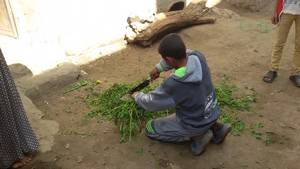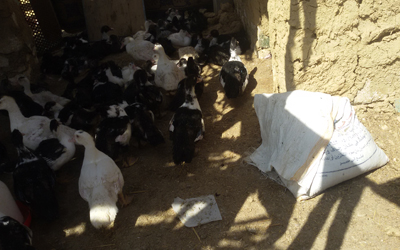However, at first she and some other women were hesitant to take funds from the project because they thought it was a loan. Taking loans has a negative connotation in villages because the social norm stigmatizes families that are known for having taken loans and consequently the family’s daughters will not have a high potential of getting married. “Who would want to marry someone burdened with debt?” said Om Waheed. Moreover, loans with interest are a taboo religion wise.
However, when women understood that these loans have no interest and will only refund 40% to help them become entrepreneurs and to improve their household income, they got encouraged to take funds and bought ducklings. Om Waheed received a batch of hundred ducklings. Rearing ducks and selling them has a short cycle (about 2 months)

- Cutting clover as fodder for ducks
Before selling her ducks, Om Waheed has put aside three to four ducks for household consumption. After selling the ducks, she celebrated with her family by having a whole duck for lunch instead of having it over three days (as usual). She has also set aside money to buy a new batch of ducklings. She then invested money in a “rotational savings scheme” with a group of women from Koftan, the village she is living in. This money will be saved to pay for private school lessons for her children
Om Waheed gained self-confidence, she felt empowered and had a better say in her daughter’s future husband – she had a sort of an upper hand in the choice since she is an owner of a project – “prestige”. She also got more resources. “Now, I can allocate more funds to the education of my children” said Om Waheed. Furthermore, it became possible for her to spend more on quality food – better nutrition – and by that increase her family’s standard of living.
Moreover, the project recommended that the group of women who bought ducks early on in the project, to select one lady to be the group’s coordinator in terms of following up with the ladies on re-payment, sending information, getting to know obstacles and communicating these to project management, etc.
This coordination system evolved in a way that it began to tackle issues related to the marketing aspects of the ducks by having the coordinator know what the premium selling price is in the market. Accordingly, they sold at premium price and gained a high net profit for each women. Hence, the coordination process transformed the women group into an informal women’s association that became influential, and capable of deciding when to sell (on a village level). Eventually, women will benefit more and more from duck rearing and will increasingly feel that their ducks are laying “golden eggs”!
The project on “Improving Household Food and Nutrition Security for women and youth in Egypt” is implemented by FAO Egypt and funded by the Italian Agency for Development Cooperation.

